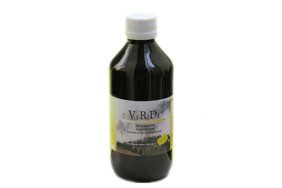 It has diuretic, astringent, and regenerative properties. Horsetail is an excellent ally for health and beauty. Let's learn about some of its most interesting properties.
It has diuretic, astringent, and regenerative properties. Horsetail is an excellent ally for health and beauty. Let's learn about some of its most interesting properties.Horsetail is one of the wild species used since ancient times and offers numerous benefits. It's a powerful medicinal plant that grows in humid climates, but is considered a "weed" by farmers. In the following article, you'll learn what horsetail is used for and what its properties are. Don't miss it!
How do you use horsetail?
There are different presentations that we can choose from to take advantage of the benefits of this plant:
- Infusion: Make it like any tea, adding a tablespoon of horsetail to every cup of boiling water. You can sweeten it with honey because the taste is somewhat bitter.
- In tincture: it is purchased in health food stores and used topically.
- In baths: add the herb to cold water and let it sit for 13 hours before immersing your feet for half an hour.
- In capsules: the pills are available in herbalists.
- In creams and gels: Used to combat cellulite. Apply once a day and massage until fully absorbed.
- In shampoo: Prepare a more concentrated tea than you would for drinking, and once cooled, add it to your regular shampoo. Use twice a week.
Properties of horsetail for internal use
The benefits of this herb are numerous. Here are some of the most notable ones:
- It is diuretic
- It helps us eliminate water and increases urine production by up to 30%. It helps us lose weight and get rid of belly fat, for example. It's used in cases of:
- Fluid retention
- Obesity
- Excess uric acid
- Arthritis
- Drop
- In addition, it prevents and treats many urinary tract diseases, reducing the chances of developing kidney stones and prostate problems in men.
- Stops bleeding
- Horsetail contains pectic and gallic acids that prevent bleeding. It is used for:
- Uterine bleeding
- Nosebleeds
- Presence of blood in the urine
- Metrorrhagia (heavy menstruation)
- Strengthens bones
Thanks to its silicon content, horsetail is recommended for older people or those who have suffered a fracture. Consuming this plant helps strengthen bones, binds calcium, and helps the body retain it longer. Horsetail also prevents tendons from tearing during exertion or exercise. It is ideal for ligament tears, muscle strains, dislocations, and also for preventing osteoporosis in menopausal women.
Improves hair and nails
Once again, we must mention silicon as one of the beneficial properties of horsetail. It helps prevent baldness and dandruff. It also strengthens brittle nails and allows them to grow faster.

Properties of horsetail for external use
If you choose to apply this herb topically, you can enjoy the following benefits:
Treats skin diseases
If you have eczema, dermatitis, or any other skin problem, horsetail is perfect for reducing symptoms. It's also used for wounds that are difficult to heal.
Cures visual problems
This herb is good for treating inflamed eyes, styes, and conjunctivitis, but also for itching and eye irritation. Due to its anti-inflammatory properties, it is a natural and effective method for preventing glaucoma, myopia, and astigmatism.
Reduces female infections
Women suffering from certain vaginal inflammations or infections can take sitz baths with horsetail. Its healing properties instantly relieve symptoms. It is also used for hemorrhoids, especially when they bleed.
Delays aging
The antioxidant action of this plant prevents the premature appearance of wrinkles on the skin, especially on the face. Its regenerative properties soften the marks and expression lines that appear when moving the mouth or eyes.
It is slimming and anti-cellulite
Massages performed with an infusion of this plant reduce fat nodules that accumulate in various parts of the body. It also helps with weight loss in the hips, thighs, and abdomen due to its slimming properties.
Contraindications and toxicity of horsetail
This plant, however, contains some substances that, if consumed in excess, can become toxic and dangerous to the body. Side effects of consuming horsetail can include:
- Digestive problems
- Headaches
- Nervousness
- Loss of appetite
- Depression
- Muscle weakness
- Irritated gastric mucosa
- Arrhythmias
- Lack of coordination
- Acceleration of the pulse
- Gastrointestinal problems
It can be an abortive herb due to its oxytocic properties (in small concentrations, it's used to accelerate labor and prevent typical pain). It is contraindicated for pregnant women and those breastfeeding.
Veride contains horsetail, making it an effective aid in preventing kidney and gallbladder diseases, as well as bladder and liver problems.






















































